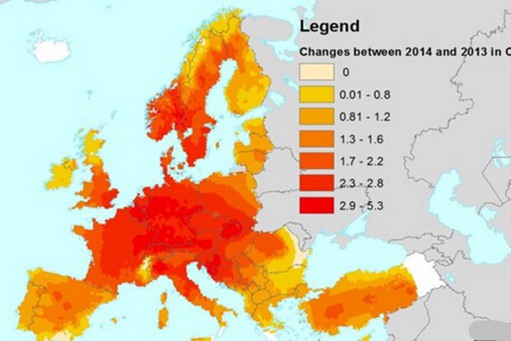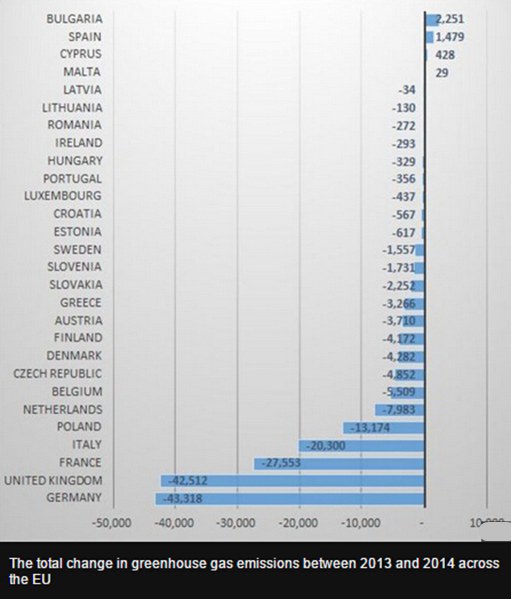导读:暖冬对欧盟国家温室气体排放量持续下降起了显著作用。

Significantly warmer winters have played an important role in the ongoing decline in EU greenhouse gas emissions.
暖冬对欧盟国家温室气体排放量持续下降起了显著作用。
According to a new report, the use of CO2 and other gases across the bloc dropped by almost a quarter between 1990 and 2014.
根据最新报道,欧盟国家CO2及其他气体的使用量在1990年至2014年间下降了近四分之一。
A switch from coal to natural gas, the recession and the rise of renewable energy all contributed to the fall.
由煤炭转用天然气、经济衰退以及可再生能源的兴起都对这个下降起到了作用。
The latest figures, from 2014, show that a milder winter was the major factor in the reduction that year.
2014年的最新数据表明,一个更温和的冬天是那年数据下降的最主要因素。
Overall from 1990 to 2014 emissions across the member states of the European Union fell by 24.4%, easily beating the 2020 target of 20% put forward as part of the first international agreement on climate change, the Kyoto Protocol.
总的来说,1990至2014年欧盟成员国排放量下降24.4%,轻松达到第一个关于气候变化的国际协议——京都协议——提出的2020年前排放量下降20%的目标。
importantly, the EU managed to reduce emissions in this period while economic output rose by 47%.
重要的是,欧盟在经济产出上升47%的同时成功降低了排放量。
The keys to cutting warming emissions over the period have been a big switch from coal to gas for electricity production, the rise of renewable energy, better home insulation and the economic recession of 2008.
这段时间温室气体排放量减少的关键在于:发电由使用煤炭转向使用天然气,可再生能源的兴起,更优良的房屋绝缘以及2008年的经济衰退。
But milder weather has contributed as well. In 2014, when emissions fell by 4.1%, it was the most important factor.
但是暖冬也起到了同样重要的作用。2014年排放量下降的4.1%中,暖冬是最主要的因素。
"If you look at the 24 year period, there is some warming in Europe and this has contributed to lower heat demand and lower greenhouse gas emissions," said Ricardo Fernandez from the European Environment Agency who compiled the figures.
“如果你看过去这24年,会发现欧洲气候在变暖,而这减少了人们对暖气的需求并降低温室气体排放,”来自收集这些数据的欧洲环境总署的Ricardo Fernandez说。
"In the last two years it has even been stronger - in 2014 you can see that, while its not the only factor, by and large it’s due to the milder winter conditions in Europe."
“过去两年这变得更显著——在2014年你会看到,欧洲的暖冬虽然不是唯一的因素,但却是最主要的因素。”
That mild, wet winter was felt particularly in Germany and the UK, and it is reductions in domestic heating demand in both those countries that accounts for just under half the decline across the 28 states that year.
德国和英国的冬天尤其令人觉得温和、潮湿,而家庭暖气需求的减少使这两个国家排放量的下降在那年占28个国家总排放量下降的一半。

Overall though, over the past 24 years the UK and Germany have both been major movers in helping to reduce greenhouse gases - in that time UK emissions have dropped by more than a third, by 34.3%.
总的来说,过去24年间英国和德国是减少温室气体的主要推动者——期间英国的排放量下降34.3%,超过了三分之一。
"In Germany after re-unification there was a lot of energy efficiency improvements such as the shutting down of inefficient power plants," said Ricardo Fernandez.
“德国在统一后采取了多种提高能源效率的举措,例如关闭效率低的发电厂,”Ricardo Fernandez说。
"In the UK there was a liberalisation of electricity production and that lead to much more gas, but beyond what happened in the 1990s both countries have continued to reduce emissions significantly."
“英国曾经因为电力生产自由化导致气体排放量增加,但在90年代这两个国家都对减少排放量有着显著贡献。”
But despite the gains, there are some areas where progress is not being made as quickly. The use of hydrofluorocarbon gases, primarily in air conditioning and refrigerators, has increased.
尽管进展不少,但也有一些领域进展不够快,像氢氟烃气体的使用(主要是空调和冰箱)就增加了。
Emissions from road transport have grown by 124 million tonnes between 1990 and 2014, now accounting for around 20% of all emissions in 2014.
道路运输的排放量在1990至2014年间增长了1亿2400万吨,占2014年总排放量的20%。
While the recession of 2008 reduced the amount of CO2 coming from this sector, the last couple of years have seen significant rises, particularly in road freight.
虽然道路运输中CO2的排放量因2008年经济衰退而减少,但过去几年它又开始显著上升,尤其在道路货运领域。
This difficult area will likely feature in discussions at the EU Commission over the coming months to decide how much each country will cut its carbon under the Paris Climate Agreement.
在接下来的几个月,欧盟委员可能要讨论这块不易解决的领域,并根据巴黎气候协议决定每个国家应减少的碳使用量。
The EU has agreed that it will cut overall emissions to 40% below the 1990 level by 2030 but it will probably be the end of this year before the 28 members can agree on how much each state will contribute.
欧盟已经决定在2030年减少排放量至1990年的40%,但可能今年年底才能知道这28个成员国将各自贡献多少。
Despite the rapid progress on the 2020 target, getting to the 2030 benchmark will require more effort all round.
虽然2020年的目标已快速完成,但达到2030年的基准需要大家更努力。
"For 2030, there has to be more, it’s not just sufficient with the current trends we have," said Ricardo Fernandez.
“2030年应该更多,而不仅仅根据我们目前的趋势,”Ricardo Fernandez说。
"At the moment the target for 2020 it is clear but for 2030 we have to step up a little bit."
“现在的目标是2020年,这很明确,但为了2030年的目标我们应该稍微加快步伐。”







